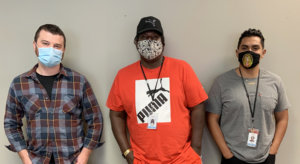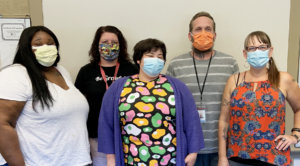This content block does not have a preview.
This content block does not have a preview.
As National Recovery Month comes to a close, we want to shine a light on a team that uses the power of recovery and supportive connections to transform lives. CCC’s Law Enforcement Assisted Diversion (LEAD) teams work to help low-level drug offenders move toward recovery, find stability and avoid reoffending.

A rare afternoon in the office for LEAD case managers Hubert Mathews, Jr. (left) and Brennan Edwards (right). The LEAD team spends most of its time out in the field, connecting with clients wherever they are.
For people experiencing homelessness, contact with the criminal justice system is often unavoidable. Offenses like trespassing, sleeping at a bus stop and “aggressive littering” – when belongings are spread out in a public space – lead to unpayable fines, arrest and incarceration. Homeless individuals who are also navigating substance use disorders are often arrested for low-level drug crimes and can get sucked deeper and deeper into the criminal justice system.
CCC’s LEAD teams work at the nexus of substance use, homelessness and criminality to disrupt that pattern. “We’re thinking differently about addiction, and recategorizing it as a mental health and social justice issue – not a criminal justice issue,” said Erica Thygesen, LEAD Program Manager.

The Multnomah County LEAD program has supported more than 300 clients in transforming their lives since the program opened in 2017. Pictured from left: Case Managers Brennan Edwards, Hubert Mathews, Jr. and Carlos Reynoso. Not pictured: Case Managers Michelle Courtney and Kayla Humphrey, Screening & Outreach Coordinator Jason Sheffey.
In Multnomah and Clackamas counties, law enforcement officers are getting that message. Since the program began in 2017, officers have diverted nearly 500 individuals toward intensive case management by the LEAD team. Case managers prioritize harm reduction, helping their clients take incremental steps toward recovery and stability. Safer use usually begins with access to Naloxone (for reversing opioid overdose), needle exchanges and safer places to sleep. As they’re ready, clients can also access health care, transitional housing, employment services, and recovery support at CCC.
Critically, clients also build positive and healthy relationships with team members. “It takes a long time for change to happen, but the more relationships they can build, the more successful they are in the long term,” said Thygesen.

“Everyone’s recovery is different, but it comes down to human connection,” said Glen Suchanek of the Clackamas County LEAD team. Pictured from left: Case Managers Charlesetta Dobson, Wendie Taber and Joslyn Gheen; Glen Suchanek, Screening & Outreach Coordinator; and Erica Thygesen, LEAD Program Manager.
It’s not an easy journey, especially during the COVID-19 pandemic, which has increased feelings of alienation, hopelessness and despair for many in our community. Many LEAD clients are vulnerable to recurrence of use, which could lead back to the cycle of arrests. But the LEAD team has flexibility to stay engaged for the long term. “People don’t fail in our programs,” said Thygesen. “They can take as long as they need to get where they’re going, even if the path is crooked.”
LEAD team members emphasize that recovery looks different for everyone – some folks are ready to move toward sobriety, while others are just celebrating making it to a court date. Regardless, the team is there to provide support. “We’re changing the trajectory of their lives,” Thygesen said.